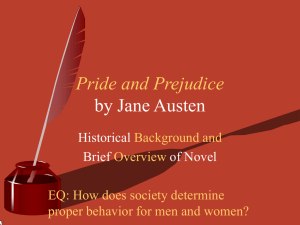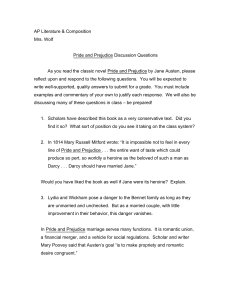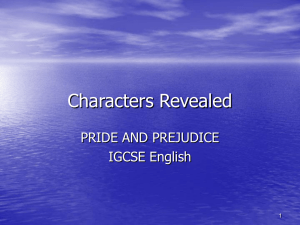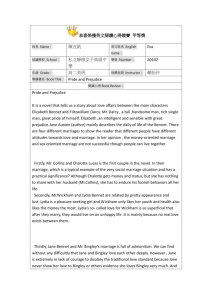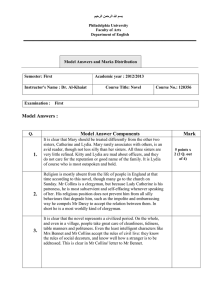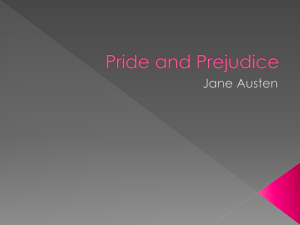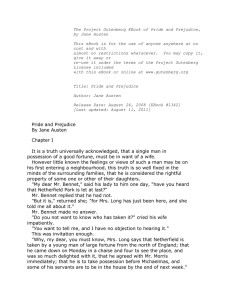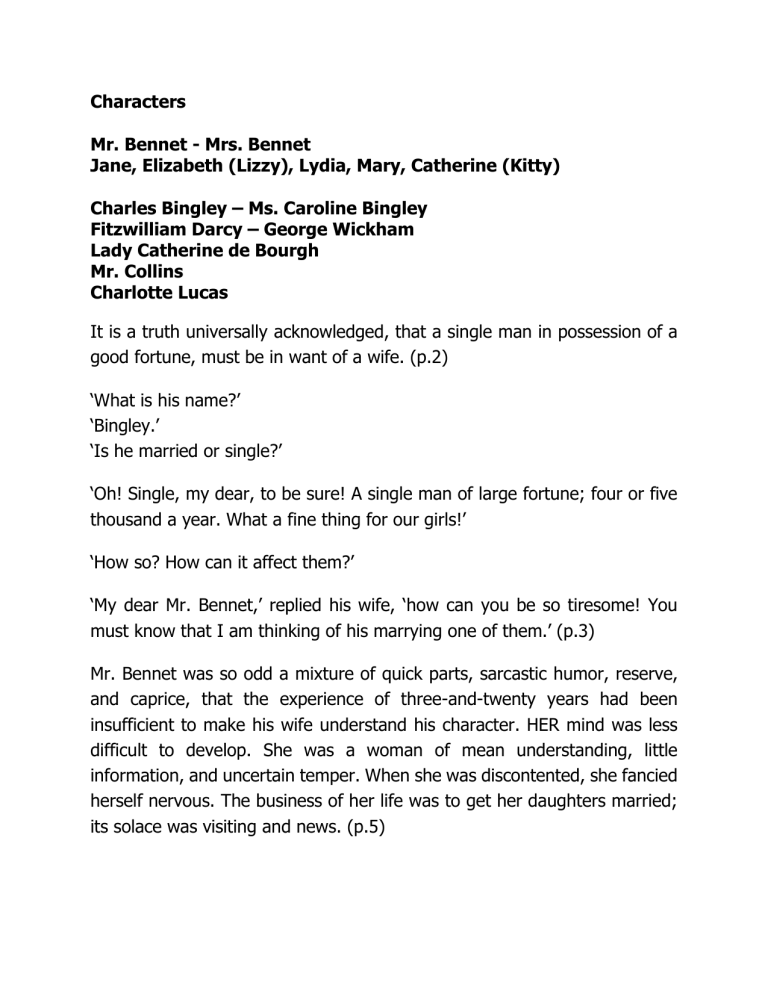
Characters Mr. Bennet - Mrs. Bennet Jane, Elizabeth (Lizzy), Lydia, Mary, Catherine (Kitty) Charles Bingley – Ms. Caroline Bingley Fitzwilliam Darcy – George Wickham Lady Catherine de Bourgh Mr. Collins Charlotte Lucas It is a truth universally acknowledged, that a single man in possession of a good fortune, must be in want of a wife. (p.2) ‘What is his name?’ ‘Bingley.’ ‘Is he married or single?’ ‘Oh! Single, my dear, to be sure! A single man of large fortune; four or five thousand a year. What a fine thing for our girls!’ ‘How so? How can it affect them?’ ‘My dear Mr. Bennet,’ replied his wife, ‘how can you be so tiresome! You must know that I am thinking of his marrying one of them.’ (p.3) Mr. Bennet was so odd a mixture of quick parts, sarcastic humor, reserve, and caprice, that the experience of three-and-twenty years had been insufficient to make his wife understand his character. HER mind was less difficult to develop. She was a woman of mean understanding, little information, and uncertain temper. When she was discontented, she fancied herself nervous. The business of her life was to get her daughters married; its solace was visiting and news. (p.5) Mr. Bingley was good-looking and gentlemanlike; he had a pleasant countenance, and easy, unaffected manners. His sisters were fine women, with an air of decided fashion. His brother-in-law, Mr. Hurst, merely looked the gentleman; but his friend Mr. Darcy soon drew the attention of the room by his fine, tall person, handsome features, noble mien, and the report which was in general circulation within five minutes after his entrance, of his having ten thousand a year. The gentlemen pronounced him to be a fine figure of a man, the ladies declared he was much handsomer than Mr. Bingley, and he was looked at with great admiration for about half the evening, till his manners gave a disgust which turned the tide of his popularity; for he was discovered to be proud; to be above his company, and above being pleased; and not all his large estate in Derbyshire could then save him from having a most forbidding, disagreeable countenance, and being unworthy to be compared with his friend. (p.12) ‘If I can but see one of my daughters happily settled at Netherfield,’ said Mrs. Bennet to her husband, ‘and all the others equally well married, I shall have nothing to wish for.’ (p.12) ‘She is tolerable, but not handsome enough to tempt ME; … (p.13) ‘His pride,’ said Miss Lucas, ‘does not offend ME so much as pride often does, because there is an excuse for it. One cannot wonder that so very fine a young man, with family, fortune, everything in his favor, should think highly of himself. If I may so express it, he has a RIGHT to be proud.’ (p.23) ‘Pride,’ observed Mary, who piqued herself upon the solidity of her reflections, ‘is a very common failing, I believe. By all that I have ever read, I am convinced that it is very common indeed; that human nature is particularly prone to it, and that there are very few of us who do not cherish a feeling of self-complacency on the score of some quality or other, real or imaginary. Vanity and pride are different things, though the words are often used synonymously. A person may be proud without being vain. Pride relates more to our opinion of ourselves, vanity to what we would have others think of us.’ (p.24) ‘To walk three miles, or four miles, or five miles, or what- ever it is, above her ankles in dirt, and alone, quite alone! What could she mean by it? It seems to me to show an abominable sort of conceited independence, a most country-town indifference to decorum.’ (p.43) A woman must have a thorough knowledge of music, singing, drawing, dancing, and the modern languages, to deserve the word; and besides all this, she must possess a certain something in her air and manner of walking, the tone of her voice, her address and expressions, or the word will be but half-deserved.’ (p.47) ‘I am,’ said he, with a firm voice. ‘And never allow yourself to be blinded by prejudice?’ ‘I hope not.’ ‘May I ask to what these questions tend?’ ‘Merely to the illustration of YOUR character,’ said she, endeavouring to shake off her gravity. ‘I am trying to make it out.’ ‘And what is your success?’ She shook her head. ‘I do not get on at all. I hear such different accounts of you as puzzle me exceedingly.’ ‘I can readily believe,’ answered he gravely, ‘that reports may vary greatly with respect to me; and I could wish, Miss Bennet, that you were not to sketch my character at the present moment, as there is reason to fear that the perfor- mance would reflect no credit on either.’ (p. 118) There are few people whom I really love, and still fewer of whom I think well. The more I see of the world, the more am I dissatisfied with it; and every day confirms my belief of the inconsistency of all human characters, and of the little dependence that can be placed on the appearance of merit or sense. I have met with two instances lately; one I will not mention; the other is Charlotte’s marriage. It is unaccountable! In every view it is unaccountable!’ (p.169) ‘No governess! How was that possible? Five daughters brought up at home without a governess! I never heard of such a thing. Your mother must have been quite a slave to your education.’ (p.207) ‘Yes, ma’am, all.’ ‘All! What, all five out at once? Very odd! And you only the second. The younger ones out before the elder ones are married! Your younger sisters must be very young?’ ‘Yes, my youngest is not sixteen. Perhaps SHE is full young to be much in company. But really, ma’am, I think it would be very hard upon younger sisters, that they should not have their share of society and amusement, because the elder may not have the means or inclination to marry early. The last-born has as good a right to the pleasures of youth at the first. And to be kept back on SUCH a motive! I think it would not be very likely to promote sisterly affection or delicacy of mind.’ ‘Upon my word,’ said her ladyship, ‘you give your opinion very decidedly for so young a person. Pray, what is your age?’ ‘With three younger sisters grown up,’ replied Elizabeth, smiling, ‘your ladyship can hardly expect me to own it.’ Lady Catherine seemed quite astonished at not receiving a direct answer; and Elizabeth suspected herself to be the first creature who had ever dared to trifle with so much dignified impertinence. (p.208) ‘In vain I have struggled. It will not do. My feelings will not be repressed. You must allow me to tell you how ardently I admire and love you.’ (p.236) ‘And this,’ cried Darcy, as he walked with quick steps across the room, ‘is your opinion of me! This is the estimation in which you hold me! I thank you for explaining it so fully. My faults, according to this calculation, are heavy indeed! But perhaps,’ added he, stopping in his walk, and turning towards her, ‘these offenses might have been overlooked, had not your pride been hurt by my honest confession of the scruples that had long prevented my forming any serious design. These bitter accusations might have been suppressed, had I, with greater policy, concealed my struggles, and flattered you into the belief of my being impelled by unqualified, unalloyed inclination; by reason, by reflection, by everything. But disguise of every sort is my abhorrence. Nor am I ashamed of the feelings I related. They were natural and just. Could you expect me to rejoice in the inferiority of your connections? —to congratulate myself on the hope of relations, whose condition in life is so decidedly beneath my own?’ (p.240) ‘You are mistaken, Mr. Darcy, if you suppose that the mode of your declaration affected me in any other way, than as it spared the concern which I might have felt in refusing you, had you behaved in a more gentlemanlike manner.’ (p.241) ‘From the very beginning—from the first moment, I may almost say—of my acquaintance with you, your manners, impressing me with the fullest belief of your arrogance, your conceit, and your selfish disdain of the feelings of others, were such as to form the groundwork of disapprobation on which succeeding events have built so immovable a dis- like; and I had not known you a month before I felt that you were the last man in the world whom I could ever be prevailed on to marry.’ (p.241) ‘We all love to instruct, though we can teach only what is not worth knowing. Forgive me; and if you persist in indifference, do not make me your confidante.’ (p.422) ‘What did you say of me, that I did not deserve? For, though your accusations were ill-founded, formed on mistaken premises, my behavior to you at the time had merited the severest reproof. It was unpardonable. I cannot think of it without abhorrence.’ (p.453) You taught me a lesson, hard indeed at first, but most advantageous. By you, I was properly humbled. I came to you without a doubt of my reception. You showed me how insufficient were all my pretensions to please a woman worthy of being pleased.’ (p.456) Mr. Bennet - Mrs. Bennet (unhappy marriage) Jane Bennet - Charles Bingley (happy marriage) Elizabeth (Lizzy) - Fitzwilliam Darcy (a must-be marriage) Lydia - George Wickham (marriage with financial grounds) Mr. Collins - Charlotte Lucas (marriage with financial grounds)

